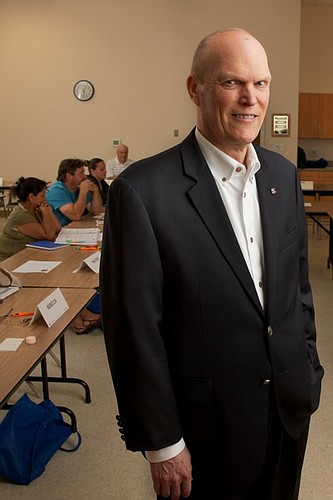- November 26, 2024
-
-
Loading

Loading

Lending to micro enterprises in the Third World got global attention when Muhammad Yunus of Grameen Bank won the Nobel Peace Price in 2006.
Today, Grameen Bank lends small amounts to millions of poor people in Bangladesh and many other developing countries to start their own businesses despite the fact that they're not considered creditworthy by traditional banks.
As the recent recession gripped Lee County during the real estate collapse, a group of business executives convened by the Southwest Florida Community Foundation decided to fund a micro-business startup program as a way to help people whose lives had been hurt by the financial disaster.
The foundation provided $85,000 to launch the Southwest Florida MicroEnterprise Project last year, selecting Goodwill Industries of Southwest Florida to run the program.
So far, 69 people have graduated from four 12-week programs that follow a course designed by the Kauffman Foundation for Entrepreneurship. Of those, 25 already were in business when they started the program. Businesses include cleaning, painting, computer repair, bakery, jewelry and child care.
But here's the challenge: The micro lender that the program selected, Accion USA, hasn't made any loans to program participants. Like all lenders, Accion has had to tighten its underwriting standards and credit scores now matter. Besides, this isn't cheap money: interest rates ranged from 8% to 15%.
So Elliott Rittenhouse Jr., Goodwill's director of microenterprise, is working on a plan to raise $100,000 to lend to these budding entrepreneurs. Rittenhouse's career spans commercial banking, stock brokerage and restaurant ownership and operation. An avid sailor with a passion for community theater, Rittenhouse also established the Maryland Small Business Development program before moving to Florida last year for lifestyle reasons.
Unlike Goodwill, most economic development groups aren't equipped to help disadvantaged people. “They're not able to address the needs of the unemployed or underemployed,” Rittenhouse says.
Already, the project landed a $75,000 grant from the U.S. Department of Housing and Urban Development through Lee County. Of that sum, $15,000 will be used for grants to aspiring entrepreneurs ranging from $500 to $2,500 each. In addition, State Rep. Gary Aubuchon of Cape Coral, an entrepreneur himself, recently donated $20,000 left over from his campaign funds to the program, Rittenhouse says.
Entrepreneurs seeking such grants will have to demonstrate their willingness to put up their own savings to start their business. “The aspiring entrepreneur needs skin in the game,” Rittenhouse says. “They have to account for every single dollar on a monthly basis.”
Rittenhouse says he's on a mission to raise $100,000 to lend to micro-enterprises initially, but he says the program needs $300,000 to be effective in lending to the 100 participants the program plans to graduate annually.
Once a loan program is under way for at least a year, it can qualify for up to $500,000 in loans and $250,000 in grants from the U.S. Small Business Administration.
In addition, many banks seek out such loan programs to satisfy requirements to lend to disadvantaged people as mandated by the federal government's “community reinvestment” laws.
If he's successful, the community loan pool could expand to neighboring Charlotte and Collier counties. “Nobody does that,” Rittenhouse says.